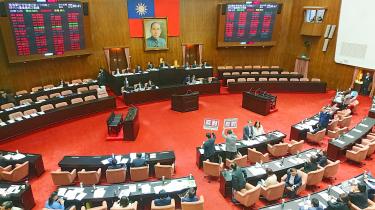Lawmakers yesterday stiffened penalties for people who leak state secrets and approved amendments to ensure that Chinese spies face the same punishment as Republic of China (ROC) citizens who commit “offenses against the external security of the state.”
The Constitution defines China as a territory of the ROC and the Criminal Code stipulates penalties for ROC citizens who collude with “foreign nations or personnel they dispatched,” so the same penalties could not be applied to Chinese spies, said Democratic Progressive Party (DPP) Legislator Wang Ting-yu (王定宇), an amendment sponsor.
As a result, spies from China are only handed light sentences under special laws, Wang added.
In the largest case involving a Chinese spy, People’s Liberation Army intelligence officer Zhen Xiaojiang (鎮小江) came to Taiwan and persuaded more than 10 military officers to collude with him, but was only sentenced to four years in prison, Wang said.
To close the loophole, Wang sponsored an addendum that would extend penalties for “offenses against external security” to Chinese nationals and residents of Hong Kong and Macau.
The amendment allows Chinese who seek to get the ROC to give over its territory to China, Hong Kong, Macau or other hostile foreign forces to be given a death sentence or life imprisonment.
It allows Chinese who obtain data on Taiwan’s military strengths and weaknesses while the nations are at war to be given a prison term of seven years to life.
The amendment allows Chinese who take classified data — documents, drawings, intelligence or physical items — from Taiwan’s armed forces to be given a prison term of seven years to life.
Another amendment to the Criminal Code allows people breaching procedures when signing an agreement with China or other nations on matters requiring government approval to be given a maximum of five years in prison, a fine of up to NT$500,000 (US$16,175) or both, while people who sign an unauthorized deal with China or other nations that harms Taiwan’s interests could face a jail term of seven years to life.
The Act Governing Relations Between the People of the Taiwan Area and the Mainland Area (台灣地區與大陸地區人民關係條例) stipulates that people who strike unauthorized agreements with China can be fined NT$200,000 to NT$2 million, which is an insignificant “paper tiger” for people willing to sell out the nation for personal gain, Wang said.
The new amendments would apply to those people, he said.
Amendments to the Criminal Code and the Classified National Security Information Protection Act (國家機密保護法) extended prison terms for people who leak state secrets to China, Hong Kong, Macau or other hostile foreign forces to three to 10 years, from one to seven years.
The amendment sets a maximum prison term of two years for those who conspire to leak secrets to other countries or hostile forces, while those found to have leaked top secret data would receive 1.5 times the recommended penalties.
Another amendment to the act allows agencies handling confidential information to add three years to the current three-year travel restriction on former personnel entrusted with state secrets — the period can be extended, but not shortened.
The amendment includes a proviso: It may not be applied to situations described in Article 12-1, which stipulates that people who know state secrets about intelligence sources or channels affecting national security should remain permanently restricted.
DPP Legislator Tuan Yi-kang (段宜康) said the amendment was not meant to obstruct anyone from visiting a foreign nation, but to bolster national security.
However, Chinese Nationalist Party (KMT) Legislator Lai Shyh-bao (賴士葆) called it a “reproachable” piece of legislation aimed at barring former president Ma Ying-jeou (馬英九) from visiting China after his restriction period ends, which would be on May 20.
Ma in January said during an interview that he hopes to visit China after May 20.
Source: Taipei Times - 2019/05/08





















